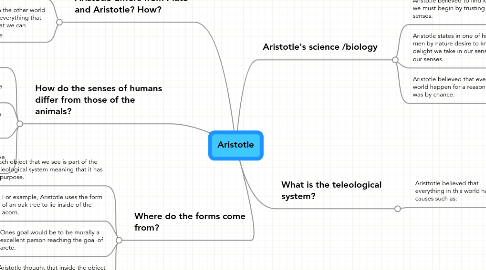Aristotle
par Steve Francis


1. Aristotle differs from Plato and Aristotle? How?
1.1. Unlike Plato and Socrates, Aristotle started as a scientific thinker. He was more of a practical thinker.
1.2. Aristotle does not belive in the other world of forms. He believes that everything that we can touch are things that we can understand.
2. How do the senses of humans differ from those of the animals?
2.1. Aristotle believes that humans have the ability to comprehend the universals which is an intellectual power called reason.
2.2. Animals that are more complex have intellectual powers such as how to solve problems.
2.3. Unlike humans animals have the power of perception and sensation.
2.4. Every single form of life have reproductive, locomotive, and nutritive powers
3. Where do the forms come from?
3.1. Each object that we see is part of the teleological system meaning that it has a purpose.
3.2. For example, Aristotle uses the form of an oak tree to lie inside of the acorn.
3.3. Ones goal would be to be morally a excellent person reaching the goal of arete.
3.4. Aristotle thought that inside the object was the form in itself, that the form would lie inside the thing itself.
4. What is the teleological system?
4.1. Aristtotle believed that everything in this world has causes such as:
4.1.1. Materiial Cause- The material form which the thing is made of.
4.1.2. Formal Cause- The shape or form a thing must take in order to be seen or recognized.
4.1.3. Efficient Cause- The actual force used to make the object.
4.1.4. Final Cause - What the ultimate purpose of the object may be.
